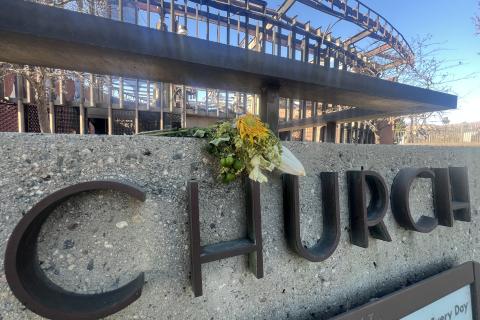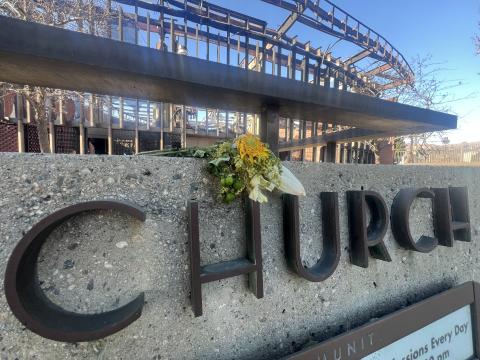Focolare founder Chiara Lubich had an extraordinary experience during the summer of 1949. Living City is now publishing a series of texts written by the Italian theologian Fr. Fabio Ciardi, OMI explaining the meaning and impact of these writings called Paradise ’49.
© Photo courtesy of Citta Nouva
As soon as Chiara Lubich saw Igino Giordani coming out of the friars’ convent, she invited him to follow her along a short path that led to the Canali Stream. She stopped and sat on a red bench along the bank of the stream and invited him to join her. “Do you know where we are?” she asked him.
Igino Giordani could have answered that they were in Tonadico, on the Dolomite Mountains, sitting on a red bench enjoying the early morning sun. Instead, he sensed that she was about to tell him something important. Something must have happened during the Mass they had attended in the church of St. Anthony, just a few meters away.
Only the previous day, he had shared with her a desire that had been slowly maturing in him since he had met her for the first time, when she arrived at his office in Italy’s parliament building. He had listened to her Gospel-based experience and heard about the group that was growing around her in Trent.
Until then, Giordani had envied the “merry brigade,” the men and women from all walks of life who, in the fourteenth century, decided to become followers of St. Catherine of Siena. He would have loved to have been born in that era and to have been one of them.
Now, in Parliament, of all places, he had at last found the person for whom he had waited so long. On July 15, 1949, only a few months after that first encounter, he asked to “be bound closely to her,” as the followers of St. Catherine used to do. He proposed to do this through a vow of obedience, so that she might guide him along the way of perfection.
For her part, Chiara Lubich suggested that they leave it up to God to indicate the kind of bond he wanted between them. She was proposing to leave it in the hands of Jesus in the Eucharist, whom they were to receive the following day, to stipulate between them a “pact of unity.” Jesus, coming into her as in an empty chalice, would have sealed the pact with Jesus in Giordani, who had to be in the same attitude of total openness and willingness.
This is exactly what happened: upon her “nothingness,” since she became an “emptiness of love” to welcome Jesus-Love, and upon his “nothingness,” like her, what remained was Jesus alone. The two of them had become the sole Jesus. The Eucharist had fully produced what it was instituted for. At the end of the Mass, both went out of the church — Chiara towards home and Giordani to the convent to give a lecture.
Chiara however felt the urge to go back into the church. Once again, she would have wanted to call Jesus by name, but she found it impossible to pronounce it. She was having the same experience as that of the Apostle Paul: “I no longer live, but Christ lives in me” (Gal 2:20). She was one with Jesus, and Jesus cannot call himself.
Therefore, Chiara uttered the word with which Jesus prayed: “Abba, Father.” That was not just a word but a reality. It was the Spirit who had put that name on her lips (Rom 8:15).
She found herself in another dimension, in the “bosom of the Father,” as she herself narrates:
I had, therefore, entered into the bosom of the Father, which appeared to the eyes of my soul (but it was as if I saw it with my physical eyes) as an abyss that was immense, cosmic. And it was all gold and flames above, below, to the right and to the left. It was infinite, but I felt at home.
Once seated on the red bench, before narrating to Igino Giordani the extraordinary fact she had experienced, she asked him: “Do you know where we are?” Someone else might have said, “Do you know where I am?” and would have spoken about her personal perception of being in the bosom of the Father.
Instead Chiara used the plural, “Do you know where we are?” because that event took place after the pact of unity sealed with Giordani. Their two souls had become one Soul, and it was this one Soul that entered within the Father’s bosom.
By the working of a grace that was charismatic in nature, she then “knew” where they were; he still did not know. Nevertheless, Chiara, right on that bench, made him aware of the new place they occupied.
The day after, she involved her companions in the same pact of unity and communicated to them, as she had done to Giordani, the new contemplations. “I described each thing so precisely to the focolarine that they too ‘saw’ in the same way,” she said. Thus they were made participants of the realities of heaven that were being revealed day after day.
That mystical experience belonged not to only one person but to a group, as Chiara, again, narrated: “I had the impression of seeing a small company in the bosom of the Father: it was us.”
At Tonadico, back on July 16, 1949, that “we” was a very small group of people. Even today, anyone may become part of that “we.” That special way of “seeing” and “knowing” the life of paradise was given to Chiara so that, through a mystical grace, she might introduce many others to the same reality, allowing them to be aware of “where we are.”
A TASTE OF PARADISE ’49
“And we were no longer ourselves, but he in us. He, the divine fire, consummated our two very different souls in a third soul — his own, all Fire.”
This is the wonder that the Eucharist performs, even today, when it enters persons willing to live the commandment of mutual love among themselves. Each makes space for the other, through total gift of self — as Jesus did in his forsakenness on the cross — and this space is filled by Jesus who, with his love, the Fire, transforms everyone into him, into the only Jesus. He lives our life and operates in us.
If you enjoyed this article, you might like...














